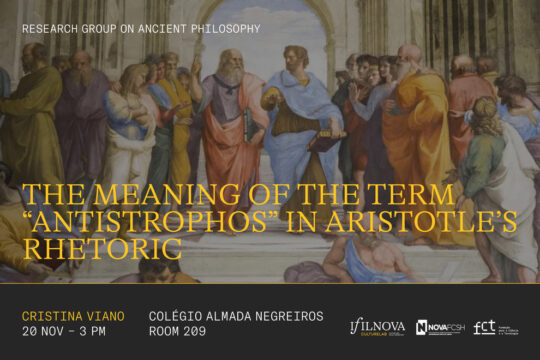
Cristina Viano | The meaning of the term “Antistrophos” in Aristotle’s Rhetoric
No dia 20 de novembro, Cristina Viano (CNRS / Centre Léon-Robin) dará uma conferência intitulada “The meaning of the term “Antistrophos” in Aristotle’s Rhetoric” no âmbito das atividades do Grupo de Pesquisa em Filosofia Antiga, coordenado por António de Castro Caeiro (CultureLab/IFILNOVA). A conferência terá lugar na sala 209 do Colégio Almada Negreiros pelas 15h.
Resumo/Abstract
In his Rhetoric, Aristotle describes it as ‘the antistrophos of dialectic’, much like Plato equated rhetoric as being to the soul to what culinary art is to the body (Pl. Gor. 465e). Three key points to consider are: (1) Aristotle’s intended meaning of ‘antistrophos’ and its implications for the rhetoric-dialectic relationship. (2) Whether Aristotle’s use of ‘antistrophos’ intentionally echoes Plato’s Gorgias and if their meanings align. (3) In my new Italian translation of Aristotle’s Rhetoric, I propose a fresh interpretation of ‘antistrophos’ that, if accurate, sheds light on Aristotle’s unique perspective on the intricate connection between rhetoric and dialectic, distinct from Plato’s.
Bio
Cristina Viano is Directeur de Recherche at Centre National de la Recherche Scientifique (CNRS), Centre Léon Robin (UMR 8061, Sorbonne-Université, Paris). Her main topics are: the ancient doctrines of matter and causation; Aristotle: natural philosophy, ethics, rhetoric and the theory of passions; Alexandrian alchemy and the relationship with Greek philosophy. She has published La matière des choses. Le livre IV des Météorologiques d’Aristote, et son interprétation par Olympiodore (Paris, Vrin 2006) and, more recently, the Italian translation, with introduction and notes of Aristotle’s Rhetoric (Laterza, Bari, 2021).
